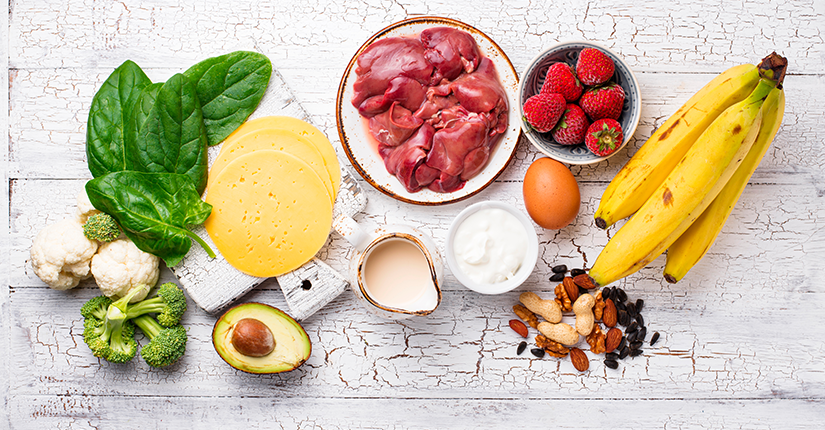WHAT IS BIOTIN?
Biotin, sometimes referred to as vitamin H, is one of the B complex vitamins which helps in the body’s ability to turn food into energy.

The term “biotin” is derived from the ancient Greek word “biotos,” which signifies “life” or “sustenance.” B vitamins, and particularly biotin, support the health of your liver, neurological system, skin, hair, and eyes.
WHAT ARE THE BENEFITS OF BIOTIN?
The B-complex vitamin biotin, sometimes referred to as vitamin B7 or vitamin H, assists the body in converting food into energy. Foods including meat, eggs, seafood, seeds, nuts, and some vegetables naturally contain Biotin. It is also important for maintenance of healthy skin, hair, eyes, liver, and nervous system. Some benefits of Biotin include:
- Hair, Skin and Nails: Biotin is essential for healthy skin, hair, and nails. While some people claim useful long-term benefits, scientific evidence for the advantages of biotin supplementation is lacking. Biotin deficiency is uncommon, however increasing consumption may be suggested to those having specific signs. For personalised biotin supplementation advice, consult with a medical practitioner.
- Blood Sugar: According to certain research, including animal studies, biotin may have benefits in managing blood glucose levels, particularly in those with type 2 diabetes. The existing evidence, however, is inconclusive. Furthermore, animal studies suggest that biotin may help reduce kidney damage in people with insulin-dependent type 1 diabetes, but further study is needed to validate these findings. It is best to seek personalised advice from a healthcare practitioner about the possible benefits of biotin supplementation in regulating blood sugar levels and related issues.
- Metabolism: Biotin is necessary for metabolism as it aids in the breakdown and utilisation of carbs, proteins, and lipids. It helps enzymes in converting these nutrients into energy, allowing for more effective metabolic activities. Adequate biotin consumption may help maintain a healthy metabolism. Consultation with a medical practitioner can offer personalised advice on the effect of biotin on metabolism.

HOW DOES BIOTIN WORK IN THE BODY?
The water-soluble vitamin biotin, commonly known as vitamin B-7 or vitamin H, is essential for several metabolic functions. It facilitates the functioning of enzymes involved in critical activities like gluconeogenesis, which is the production of glucose from non-carbohydrate sources like amino acids. Additionally, biotin helps enzymes produce fatty acids and contributes towards breakdown of amino acids, particularly vital ones like leucine. Biotin assists in the digestion of carbs, lipids, and proteins as well as the conversion of food into energy by taking part in various metabolic processes.
Water-soluble vitamins cannot be stored by the body; hence it is important to get enough biotin from food sources or supplements. Including meals containing biotin or thinking about taking biotin supplements can boost this vitamin’s ideal levels in the body. However, it is critical to consult a healthcare practitioner to figure out the optimum dosage and ensure that person’s needs are addressed. They can offer specialised advice on biotin consumption based on a person’s specific circumstances and health needs.
HOW MUCH BIOTIN A PERSON CAN TAKE?
For young people and adults, the daily recommended amount of biotin usually ranges between 30 and 100 micrograms (mcg). It is crucial to remember that because biotin is water-soluble, any excess is normally eliminated by urination. While most people absorb biotin supplements well, some people may have mild side effects including nausea and intestinal pain. As with any dietary supplement, it is best to get medical advice before using it to identify the right dosage and treat any issues or potential adverse effects.
WHAT ARE THE DIFFERENT TYPES OF BIOTIN?
Biotin is also known as:
- Vitamin B7 D-Biotin (Vitamin H) 1% On Dicalcium Phosphate
- Vitamin B7 D-Biotin (Vitamin H) 1% On Maltodextrin
- Vitamin B7 D-Biotin (Vitamin H) 100%
- Vitamin B7 D-Biotin (Vitamin H) 2% On Dicalcium Phosphate
- Vitamin B7 D-Biotin 0.5% Food State on Yeast
- Vitamin B7 D-Biotin 5% Food State On Buckwheat
Biotin is commonly available as:
- Biotin tablets
- Biotin capsules
- Biotin liquid
- Biotin gummies
Glentworth Formulations is here to suit your every need. Everything from Tablets, Capsules and Powder blends.
If you are wanting to know more information, please get in contact with us. Either using the contact form or contacting us directly on: [email protected].


